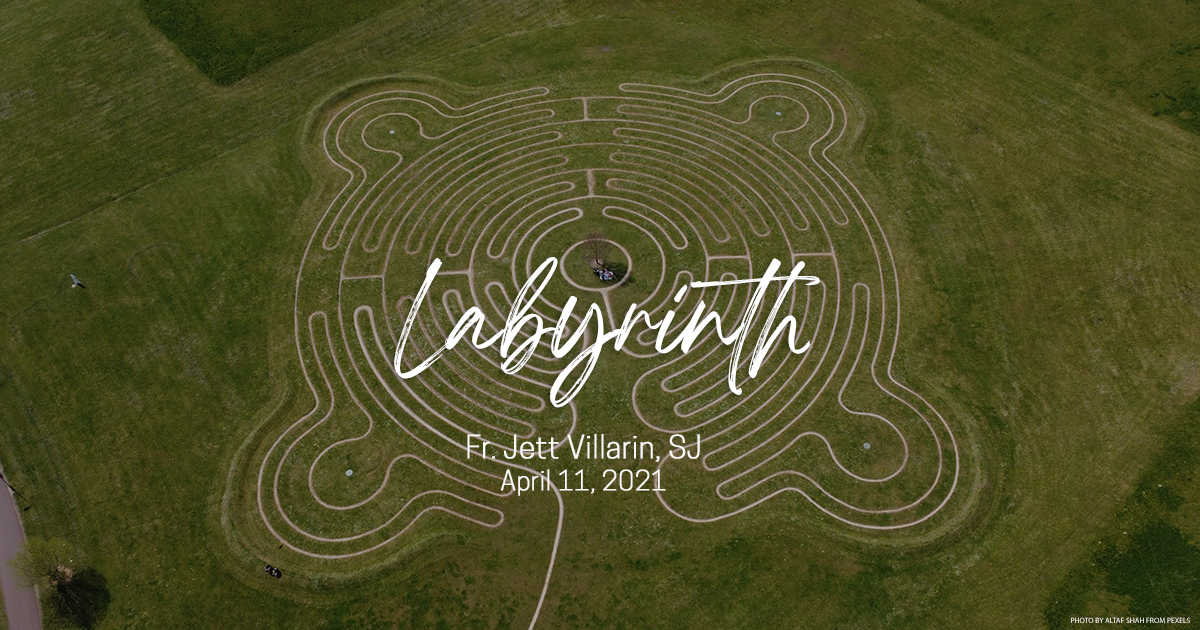


Fr. Jett Villarin, SJ
April 11, 2021
When you go through the garden labyrinth at the Mirador Jesuit Villa in Baguio, you will eventually end in the center. However, while walking and winding your way on this path, you will find yourself sometimes moving farther away from the center. You will not worry; you won’t even think twice about being lost because you know that however circuitous the path may be, you will eventually land in the center.
Your inner calm depends on your having seen the labyrinth and its center from where you stand, from above, from what we call a three-dimensional or 3D perspective.
Now imagine yourself to be a two-dimensional 2D flatlander, a creature like an ant who lives on the surface, who understands only the surface, who knows only length and width and nothing about height or depth, who cannot fathom what is above and below the surface. If you, a flatlander, were to go through this labyrinth, you might grow weary and fearful and anxious, not really knowing when or if you will ever get to the center and end of it all.
Understandably, your inner panic is fueled by your limited vision. You can only see the surface and walls to the side of you. Your depthless, 2D monovision prevents you from knowing where all these winding ways are headed. You can only see so far really.
Before Easter, we were all living 2D lives. We were all crawlers confined to the ground, unable to see beyond, beneath, and above the surface. Jesus Christ entering our lives has given us a much richer 3D perspective. And rising from our surface lives, he has given us all a deeper field of vision.
We should thank Thomas for being late in the Gospel story today. Because he was late, he missed Jesus the first time. And missing him, he defended his doubt for all of us to hear and own: “Unless I see… I will not believe.” Unless I see him, unless I touch him and hear him, I will not believe.
The doubt of Thomas is all very 2D, indeed understandable of surface dwellers who need to see first before they will ever believe. Flatlanders find comfort in the predictable and clear confines of their 2D world.
When the Lord finally appears to Thomas, he tells him and us: You believe because you have seen. Blessed are they who have not seen, and yet believe.
Yet another beatitude, this time blessing those who risk believing in Jesus on the mere witness of words and lives of those who have been touched by him.
Another beatitude, which blesses those who take the risk of faith, but one which twists the doubter’s premise by proclaiming instead, “no, Thomas, unless you believe, you will never see.”
Unless we believe, we will never see.
Unless we believe in him risen, we will never see his love outlasting death, even to this day, and how that very love awakens us to rise from our surface concerns and offer our own lives for others.
Unless we believe that Christ can go through locked doors, that he is present even now in this time of terrible sorrow and fear, present even in our places of hiding, we will never see peace. And we will never know the height and depth of God’s love that gives us the will to keep on moving despite all that is locked down in the labyrinth that is our lives today.
Unless we believe in the irrevocable offer of mercy that has been made to us on the cross of Christ, we will never see our true worth in the eyes of God. And not seeing this, we will be unforgiving to ourselves and others.
Unless we believe in Jesus as the Christ, the beloved One begotten by God, we will never see ourselves as children of God, created in his image and likeness, begotten by him, out of love. And not seeing our true birthright, we will live like slaves, sad and afraid for our lives. (1 Jn 5, 2nd rdg)
Unless we believe that God gave us everything in and through His own Son, even this garden that is our world, we will never see the point of sharing our life and goods, the way the early Church lived their communion of life with joy and courage. Not seeing the gifts that surround us, we will be selfish and ungracious to each other. (Acts 4:32, 1st rdg)
Unless we believe that grace will always be greater than sin, and mercy stronger than vengeance, unless we believe that hope will always be larger than pain, and our love more lasting than death, we will never see what God invites us and dares us to see.
Let us rise then today, with him who is risen. Let us believe in him so that we may see more than just surface and walls. Let us walk this labyrinth together, unfazed, unafraid, however circuitous our paths have been all these months of the pandemic. Believing in him, standing our ground, no matter the twists and turns our lives have taken, by God’s mercy, we shall make it to the end of this labyrinth. Only by the mercy of God will we ever make it to the very end, the very center our lives have sought and found.